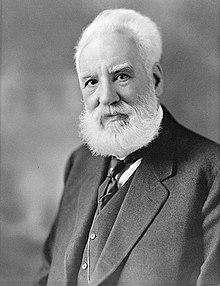Early Life and Education
– Alexander Graham Bell was born in Edinburgh on March 3, 1847.
– His father was Alexander Melville Bell, a phonetician, and his mother was Eliza Grace Bell.
– Bell had two brothers, Melville James Bell and Edward Charles Bell.
– Bell adopted the middle name Graham out of respect for Alexander Graham, a family friend.
– He showed curiosity and inventiveness from a young age, building a homemade dehusking machine and experimenting with communication techniques.
– Bell received early schooling from his father and later attended the Royal High School.
– He left school at the age of 15 and pursued further education at the University of Edinburgh and University College London, focusing on elocution and speech.
First Invention and Experiments with Sound
– Bell developed a talent for art, poetry, and music, becoming the family’s pianist.
– He entertained guests with mimicry and voice tricks and developed a technique to communicate with his gradually deaf mother.
– Bell’s first serious work on the transmission of sound began with experiments using tuning forks to explore resonance.
– He built an automaton head and experimented with a live subject, the family’s Skye Terrier, to create a lifelike speaking head.
– Bell’s experiments with sound manipulation and resonance were influenced by existing work in Germany.
Contributions and Achievements
– Bell patented the first practical telephone and co-founded AT&T.
– He made groundbreaking contributions to optical telecommunications, hydrofoils, and aeronautics.
– Bell served as the second president of the National Geographic Society.
– His work on human heredity is considered his most notable contribution to basic science.
– Bell’s dedication to integrating the deaf and hard of hearing led to the establishment of the Volta Bureau and laid the foundation for the development of the telephone.
Work with the Deaf and Beliefs on Deaf Education
– Bell trained instructors at the Boston School for Deaf Mutes and other institutions, using his Visible Speech System.
– He opened his School of Vocal Physiology and Mechanics of Speech in Boston.
– Bell’s ideas on deaf education supported speech therapy and lip reading over sign language.
– He faced criticism from the Deaf community for potentially causing the closure of deaf schools.
– Bell did not support a ban on deaf people marrying each other.
Invention of the Telephone and Legacy
– Bell’s initial work on the harmonic telegraph progressed to the invention of the telephone.
– He conducted experiments with a phonautograph and believed in generating undulating electrical currents corresponding to sound waves.
– Bell’s patent for the telephone was issued on March 7, 1876, leading to a controversy with Elisha Gray.
– He established the Bell Telephone Company and made improvements to the telephone design.
– Bell’s invention revolutionized communication technology, and his legacy as an inventor and educator continues to be celebrated today. Source: https://en.wikipedia.org/wiki/Alexander_Graham_Bell
Alexander Graham Bell (/ˈɡreɪ.əm/, born Alexander Bell; March 3, 1847 – August 2, 1922) was a Scottish-born Canadian-American inventor, scientist and engineer who is credited with patenting the first practical telephone. He also co-founded the American Telephone and Telegraph Company (AT&T) in 1885.
Alexander Graham Bell | |
|---|---|
 Bell c. 1917 | |
| Born | Alexander Bell March 3, 1847 Edinburgh, Scotland |
| Died | August 2, 1922 (aged 75) Beinn Bhreagh, Nova Scotia, Canada |
| Citizenship | United Kingdom (1847–1922) British-subject in Canada (1870–1882) United States (1882–1922) |
| Education | |
| Occupations |
|
| Known for | Invention of the telephone b Co-founder of Bell Telephone Company, Bell Canada & AT&T |
| Spouse | |
| Children | 4 |
| Parents |
|
| Relatives |
|
| Awards |
|
| Signature | |
| Notes | |
| |
Bell's father, grandfather, and brother had all been associated with work on elocution and speech, and both his mother and wife were deaf; profoundly influencing Bell's life's work. His research on hearing and speech further led him to experiment with hearing devices which eventually culminated in Bell being awarded the first U.S. patent for the telephone, on March 7, 1876. Bell considered his invention an intrusion on his real work as a scientist and refused to have a telephone in his study.
Many other inventions marked Bell's later life, including groundbreaking work in optical telecommunications, hydrofoils, and aeronautics. Bell also had a strong influence on the National Geographic Society and its magazine while serving as the second president from January 7, 1898, until 1903.
Beyond his work in engineering, Bell had a deep interest in the emerging science of heredity. His work in this area has been called "the soundest, and most useful study of human heredity proposed in nineteenth-century America... Bell's most notable contribution to basic science, as distinct from invention."
